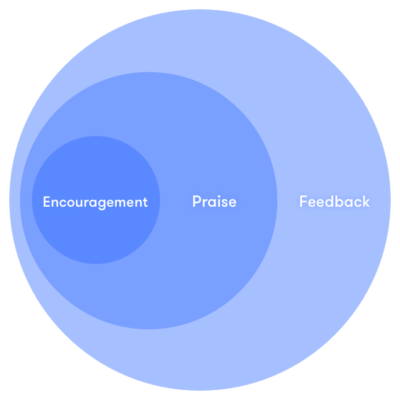
While instincts say that any form of positive feedback does wonders for employee morale and, therefore, productivity, empirical research points to a different truth. Offering meaningful words of encouragement for employees is as much an art as it is a science. It seems not all forms of positive feedback are created equal: while words of encouragement for employees do have the potential to energize, inspire, and motivate, the wrong kind of praise can do more harm than good. But what exactly does “the wrong kind of praise” really mean?
In this article we’ll explain how feedback, praise, and encouragement are distinct concepts, discuss why of the three, encouragement yields the most benefit, and establish clear guidelines for delivering words of encouragement for employees that effectively support performance.
Feedback, Praise, and Encouragement
Though the words may be interchangeable in casual conversation, mastering management and motivation means distinguishing encouragement from praise and feedback.

The field of motivational psychology (which focuses on all three of these concepts) is yet to arrive at a consensus on exactly how to parse them. Experts do agree that feedback, praise and encouragement are distinct somehow, but specific opinions vary. What some studies call “highly effective” praise is classified as a separate mode of communication (encouragement) in others.
In this article, we’ll conceptualize praise as a specific type of feedback, and encouragement as a specific type of praise. You can imagine the three as concentric categories, with feedback as the all-encompassing term and encouragement as the most restricted concept within it.
Here’s how we define each:
Feedback
Feedback is any and all information communicated about the quality of someone’s performance. It can be positive, negative, or a combination of both. It’s a broad term, encompassing constructive criticism, compliments, recommendations, reprimands, and more. Praise and words of encouragement for employees also fall under this umbrella term.
Praise
Praise is a purely positive form of feedback. It addresses the successful elements of a persons’ performance, and those elements alone. One study defines praise broadly as, “positive evaluations made by a person of another’s products, performances or attributes.” In other words, “praise” is the positive segment of the broader category, “feedback.”
Encouragement
Some experts regard praise and encouragement as side-by-side concepts, but we think of encouragement as a specific variety of praise. Encouragement focuses on the deed rather than the doer, internal satisfaction as opposed to external approval, and effort over outcome. It’s these attributes that make words of encouragement for employees so reliably conducive to success. We’ll unpack why later in this article.

Most research on the effects of praise versus encouragement has been conducted in a classroom setting, but the range of ages included in these studies taken in combination with a few fringe cases that examine praise and encouragement in other settings give us good reason to believe their findings are generalizable.
It’s time for corporate leaders to pay attention to educators’ lessons about the nuances of these three concepts and deliver impactful words of encouragement for employees.
When Praise Is Problematic
People praise because they want to encourage more of the behavior or end-product they are praising. And yet, this isn’t always praise’s effect.
There are several occasions when praise incites almost directly the opposite of its intended results. We’ll discuss the three most common ones here.
1. Inflated Praise
When the accolades are bigger than the accomplishment, this is inflated praise. Overhyping a small victory, using hyperbolic language like “perfect” or “best ever,” and glossing over mistakes are all parts of inflated praise. Unlike words of encouragement for employees, exaggerated praise offers little benefit to its recipient.

When praise is painfully exaggerated — as in, an employee who did the bare minimum is celebrated as though they’ve tripled the company’s valuation — the recipient loses trust in the person giving the praise. Clearly disproportionate praise is an indication of either horrible judgement, or outright dishonesty. Either way, the praise loses meaning and the praiser credit.
When praise’s inflation is less obvious, instead of losing faith in the praiser’s credibility, the recipient loses faith in themselves. Imagine being zealously applauded for a simple task. You might wonder, are my abilities really so limited that this small feat is cause for celebration? Am I really that incapable? Research confirms that praise for easy tasks leads to inferences of low ability.
Lastly, many studies on inflated praise examine its effects as a function of self-esteem. When people have high self-esteem, inflated praise feeds an unhealthy level of hubris. When people have low self-esteem, inflated praise has the opposite (but equally damaging) effect: the recipient freezes in fear that they’ll never reach such heights again. This discourages low self-esteem recipients from attempting anything at all in anticipation of what they see as inevitable failure.
In all of these cases, inflated praise does little to benefit the praiser, the “praisee,” or the company.
2. Judgmental Praise
Behavioral psychologist Alfie Kohn cautioned that sometimes, “the most notable aspect of a positive judgement is not that it is positive, but that it is a judgement.” While this isn’t true of all praise, it’s something to keep in mind.

Positive feedback oriented around living up to another person’s expectations (e.g. “I feel so happy with the way you’ve approached this project”) fall under the category of “judgmental praise.” When it comes to praise, “I” statements are actually the antithesis of productive communication.
Especially when applied to functions that the recipient was already intrinsically motivated to perform, judgmental praise obliterates individual ownership over standards by reminding the recipient that they’re working to please someone else.
This not only sucks dry that person’s well of motivation, but also can contribute to increased self-consciousness and self-doubt. Rather than deferring to their own judgement to assess their quality of work, these recipients will start to judge work by its likelihood to elicit praise from another party.
3. Person Praise
One of the key ways words of encouragement for employees are distinct from praise is that they focus on the deed, not the doer. Person praise focuses on complimenting the individual rather than the action or outcome, which can cause problems for employees.

While it may seem encouraging to tell employees that they are smart, or talented, or successful, this kind of praise actually pressures the recipient to live up to a projected identity instead of encouraging them to produce high quality work. Motivational expert Carol Dweck explains that praising qualities such as intelligence sends the message “look smart, and don’t risk making mistakes.”
One educational study found that children who are told, “You must be smart at this” are less likely to take on challenges, exert extended effort, and persevere through roadblocks than children told, “You must have worked really hard.”
Why? Person praise highlights fixed qualities that lie beyond an individual’s control. This implies that success is contingent on unchangeable traits, meaning if a person fails or struggles it’s because they’re incapable — not because they need a new strategy. Understandably, this enables people to give up faster and exert less effort. It also encourages the recipient to try and uphold an image of intelligence, rather than intelligence itself. Better not to disappoint than fail and shatter the illusion.
To be clear, we’re not arguing that praise is a disservice masquerading as something good. The right kind of recognition nourishes everything from engagement and morale to productivity, and the examples above do not negate that. Rather, we’ve called them to attention to illustrate that praise’s effects are shaped by a myriad of circumstances concerning far more than the giver’s intention.
Knowing this, the next logical question is: how does one avoid problematic praise? The following section holds its answer.
Effective Words of Encouragement for Employees
Encouragement is distinct from generic praise in that it promotes autonomy, perseverance, and self-efficacy. It focuses on specific elements of performance and has been proven to benefit the recipient. The following three guidelines will help you deliver reliably effective words of encouragement for employees that sidestep the pitfalls of problematic praise.
1. Encourage the Process, Not the Product
Whereas praise glorifies success, words of encouragement for employees focus on process and strategy.

It is, of course, wonderful to behold the shining end-result of a job well done. But leaders looking to effectively support their teams should focus on praising the steps that led up to success rather than success itself. Experts recommend calling out things like effort, strategy, self-correction, thoughtfulness, and concentration. After all, the preceding steps are where the real work takes place.
Focusing on elements of the process such as these, rather than on an end-product, encourages a growth mindset. This orients encouragement around controllable actions, which makes success a byproduct of effort rather than innate ability, chance, or good fortune. It gives the recipient ownership over results, and encourages them to use the same praised process in future work. In the long-term, this kind of praise will help employees work through challenges and support sustainable and repeated success.
2. Encourage Autonomy
Encouraging autonomy through positive feedback empowers the recipient to continue performing at a high level without making them reliant on others’ feedback. The two most important rules for delivering autonomy-promoting words of encouragement for employees are:
- Never praise through comparison. Praise that measures one employee’s performance against others’ is nothing but relative. Is your employee really great, or is the rest of the team just incompetent?
- Never base feedback on personal opinion. Praise that speaks to the praiser’s personal opinion (also known as judgmental praise) is founded on similarly shaky relativity.

Instead of using these subjective reference points to compliment outstanding performance, craft words of encouragement for employees that speak to strengths they can own. Don’t tell your employee they work more quickly than the rest of the team — tell them they’re efficient. Don’t tell them their report was your favorite — get specific; tell them that their use of data visualization made the numbers easy to digest.
Positive feedback like this is more than praise — it speaks to specific actions that lie within the employee’s control. When you untether feedback from the relativity of other peoples’ performance and opinions, you speak directly to the strengths that make an employee uniquely praiseworthy. Knowing that they own these strengths, whether or not they are always seen, surpassed, or acknowledged by people around them inspires autonomy.
3. Encourage Repeatable Actions
The third and last guideline for delivering words of encouragement for employees is to point feedback at repeatable actions. This recommendation is based on a simple rule of human psychology: that which is recognized will be repeated.

Encouraging repeatable actions yields a dual-value. First, it boosts morale and engagement almost instantaneously. It’s also a long-term investment in shaping the behaviors that will define future company success.
We’ve already discussed one example of a repeatable action that leaders should praise employees for: process. There are others too: cross-team collaboration, long-term company goals, and demonstrations of company core values are all great, repeatable behaviors for employers to praise.
Rather than praising something ultra-specific, call out employees for behaviors you want to see more of. It’s a straightforward way to design your company’s cultural and behavioral standards. No matter what stage your business is at, strengthening these factors is key to success.
How to Prevent Problematic Praise
Learning that praise can be counterproductive might leave you feeling anxious about inadvertently delivering the wrong kind of feedback. Keep in mind that the occasional instance of misguided praise will not take down your entire organization. We’ve called these instances of less-than-productive praise to attention to highlight the importance of establishing a formal recognition program that, over time, builds success.
A well-structured employee recognition program can be a systematic way to establish standard feedback practices across your entire company. There are two primary ways employee recognition programs help keep these standards in place:

1. Educational Opportunities
Whether it happens at onboarding or when your employee recognition program first launches, some element of your program should be educational. In the same breath that you explain the logistics of your program (how to log in, redeem rewards, etc.), you can address best practices. It doesn’t have to be complicated or overly involved — even setting a few key guidelines based on what you’ve learned from this article will do a lot to shape how recognition unfolds.
2. Custom Recognition Occasions
The right employee recognition programs also work against problematic praise by allowing informed leaders to set thoughtful recognition occasions.
Rather than having a stream of random recognition that may or may not align with the best practices we’ve shared, setting recognition occasions allows you to have some influence over the kind of recognition that will be exchanged. For example, many companies find setting recognition occasions related to company core values or long-term business goals to be especially effective — these things are repeatable actions, often speak to process, and are judgement-free in a way that boosts autonomy.
By implementing a thoughtful employee recognition program, you can sidestep problematic praise and ensure the exchange of beneficial words of encouragement for employees. You may be surprised at the impact these subtle adjustments in communication style make on your company’s culture and employee experience.
 Katerina Mery is a Marketing Specialist at Fond with a background in cognitive psychology and a passion for improving the way people live and work. She especially enjoys learning about how to accomplish this through rewards and recognition. In her spare time, you can find Katerina running outside, admiring art, and exploring the latest and greatest local restaurants.
Katerina Mery is a Marketing Specialist at Fond with a background in cognitive psychology and a passion for improving the way people live and work. She especially enjoys learning about how to accomplish this through rewards and recognition. In her spare time, you can find Katerina running outside, admiring art, and exploring the latest and greatest local restaurants.
